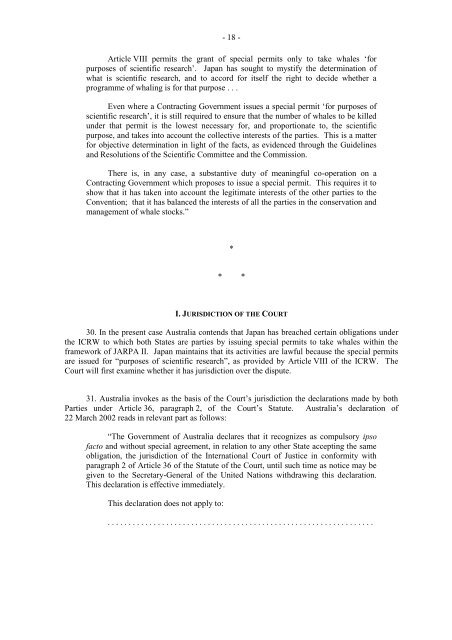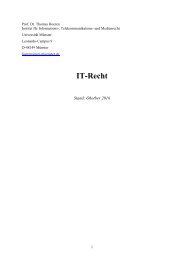3d4yVkKMl
3d4yVkKMl
3d4yVkKMl
Create successful ePaper yourself
Turn your PDF publications into a flip-book with our unique Google optimized e-Paper software.
- 18 -<br />
Article VIII permits the grant of special permits only to take whales ‘for<br />
purposes of scientific research’. Japan has sought to mystify the determination of<br />
what is scientific research, and to accord for itself the right to decide whether a<br />
programme of whaling is for that purpose . . .<br />
Even where a Contracting Government issues a special permit ‘for purposes of<br />
scientific research’, it is still required to ensure that the number of whales to be killed<br />
under that permit is the lowest necessary for, and proportionate to, the scientific<br />
purpose, and takes into account the collective interests of the parties. This is a matter<br />
for objective determination in light of the facts, as evidenced through the Guidelines<br />
and Resolutions of the Scientific Committee and the Commission.<br />
There is, in any case, a substantive duty of meaningful co-operation on a<br />
Contracting Government which proposes to issue a special permit. This requires it to<br />
show that it has taken into account the legitimate interests of the other parties to the<br />
Convention; that it has balanced the interests of all the parties in the conservation and<br />
management of whale stocks.”<br />
*<br />
* *<br />
I. JURISDICTION OF THE COURT<br />
30. In the present case Australia contends that Japan has breached certain obligations under<br />
the ICRW to which both States are parties by issuing special permits to take whales within the<br />
framework of JARPA II. Japan maintains that its activities are lawful because the special permits<br />
are issued for “purposes of scientific research”, as provided by Article VIII of the ICRW. The<br />
Court will first examine whether it has jurisdiction over the dispute.<br />
31. Australia invokes as the basis of the Court’s jurisdiction the declarations made by both<br />
Parties under Article 36, paragraph 2, of the Court’s Statute. Australia’s declaration of<br />
22 March 2002 reads in relevant part as follows:<br />
“The Government of Australia declares that it recognizes as compulsory ipso<br />
facto and without special agreement, in relation to any other State accepting the same<br />
obligation, the jurisdiction of the International Court of Justice in conformity with<br />
paragraph 2 of Article 36 of the Statute of the Court, until such time as notice may be<br />
given to the Secretary-General of the United Nations withdrawing this declaration.<br />
This declaration is effective immediately.<br />
This declaration does not apply to:<br />
. . . . . . . . . . . . . . . . . . . . . . . . . . . . . . . . . . . . . . . . . . . . . . . . . . . . . . . . . . . . . . . .



